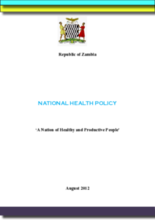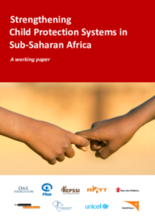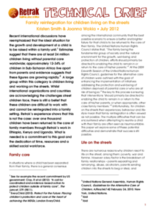Displaying 12961 - 12970 of 14579
A document containing the policy for foster care and adoption in Lesotho.
This document contains the Procedures and Practice Guidelines for Foster Care and Adoption in Lesotho.
This document outlines an overarching National Health Policy for Zambia.
This article describes the Blueprints database of evidence-based programmes (EBPs) and its potential application in children's services in European countries.
This paper is a response to the increasing need for agreement on approaches and documented evidence of good practices consistent with system strengthening work. The purpose of the Inter-Agency Working Paper is to consolidate current thinking, examples and lessons learned about child protection system strengthening in sub-Saharan Africa and suggest a way forward.
Research was conducted in five Rift Valley towns in Kenya in 2011 to understand the link between emergencies and the perceived increase of children joining the streets. Findings show that emergencies such as Post Election Violence and drought have caused children to join the streets. By far the biggest reason for children joining the streets was food insecurity. The authors advocate for an urgent, large-scale response to place children currently connected to the streets in durable situations in tandem with a multi-sectorial development approach to tackle and address the root of the crisis.
This mapping and assessment report of Malawi’s Child Protection System offers key recommendations to strengthen the child protection system, including enforcing legislation, coordinating mechanisms, building capacity of the social service workforce, harmonization of child protection services, and strengthening accountability mechanisms.
Virginia Commonwealth University Professors, Karen Smith Rotabi and Rosemary Farmer, examine impact of neglect on brain development in their recent podcast, Orphaned and Vulnerable Children and Brain Development. Through the persepective of the intersection of neuroscience and social welfare practice, Farmer and Rotabi examine how poverty of experience and such potential adverse situations as institutionalization disrupt brain development in babies and young children.
This article describes the results of a meta-analytic review aimed at providing an estimate of the prevalence of physical and emotional neglect by integrating prevalence figures from the body of research reporting on neglect. It discusses and makes recommendations on the dearth of studies investigating the prevalence of child neglect, despite evidence of its severe consequences on millions of children, and a global prevalence estimated to be above 15%.
Retrak’s technical brief on family reintegration for children living on the streets, acknowledges the difficulties which street children face at home and on the streets. But it also demonstrates that successful family reintegration is possible for street children when there is a focus on the individual child, building positive attachments with care-givers, strengthening families capabilities and involving the wider community.







